Feb. 2, 2023
Thesaurus : Doctrine

► Full Reference: B. Silliman, "Secret professionnel et coopération : les leçons de procédure tirées de l’expérience américaine pour une application universelle" ("Privilege and cooperation, procedural lessons learned from the U.S for global application"), in M.-A. Frison-Roche (ed.), La juridictionnalisation de la Compliance, coll. "Régulations & Compliance", Journal of Regulation & Compliance (JoRC) and Dalloz, 2023, p. 231-234.
____
📕read a general presentation of the book, La juridictionnalisation de la Compliance, in which this article is published
____
► English summary of the article (done by the Journal of Regulation & Compliance): The French legal system is evolving, organizing interaction between lawyers with regulators and prosecutors, especially in investigations about corruption or corporate misconduct, adopting U.S. negotiated resolutions such as the Convention judiciaire d'intérêt public, which encourages "collaboration" between them.
The author describes the evolution of the U.S. DOJ doctrine and askes French to be inspired by the U.S. procedural experience, U.S. where this mechanism came from. Indeed, the DOJ released memoranda about what the "collaboration" means. At the end (2006 Memorandum), the DOJ has considered that the legal privilege must remain intact when the information is not only factual to maintain trust between prosecutors, regulators, and lawyers.
French authorities do not follow this way. The author regrets it and thinks they should adopt the same reasoning as the American authority on the secret professionnel of the avocat, especially when he intervenes in the company internal investigation.
____
🦉This article is available in full text for those registered for Professor Marie-Anne Frison-Roche's courses
Updated: Feb. 2, 2023 (Initial publication: June 23, 2021)
Thesaurus : Doctrine

► Full Reference: J. Heymann, "La nature juridique de la "Cour suprême" de Facebook" ("The legal nature of Facebook's "Supreme court""), in M.-A. Frison-Roche (ed.), La juridictionnalisation de la Compliance, coll. "Régulations & Compliance", Journal of Regulation & Compliance (JoRC) and Dalloz, 2023, p. 151-167.
____
📕read a general presentation of the book, La juridictionnalisation de la Compliance, in which this article is published
____
► The summary below describes an article following the colloquium L'entreprise instituée Juge et Procureur d'elle-même par le Droit de la Compliance , co-organized by the Journal of Regulation & Compliance (JoRC) and the Faculté de Droit Lyon 3. This manifestation was designed under the scientific direction of Marie-Anne Frison-Roche and Jean-Christophe Roda and took place in Lyon on June 23, 2021.
In the book, the article will be published in Title I, devoted to: The Entreprise instituted Judge and Prosecutor of itself by Compliance Law.
____
► Summary of the article (done by the author): Taking place in the general theme aiming at making “words and things coincide”, the article offers some thoughts on the “conditions of the discourse” – in the sense in which Foucault understood it in his Archéologie des sciences humaines – relating to the phenomenon of “jurisdictionalization” of Compliance.
The thoughts are more specifically focusing on the nature of the so-called “Supreme Court” that Facebook instituted to hear appeals of decisions relating to content on the digital social networks that are Facebook and Instagram. Is this really a “Supreme Court”, designed in order to “judge” the Facebook Group?
A careful examination of the Oversight Board – i.e. the so-called “Supreme Court” created by Facebook – reveals that the latter, in addition to its advisory mission (which consists of issuing policy advisory opinions on Facebook’s content policies), exercises some form of adjudicative function. This is essentially conceived in terms of compliance assessment, of the content published on the social networks Facebook or Instagram with the standards issued by these corporations on the one hand, of content enforcement decisions taken by Facebook with the Law on the other hand. The legal framework of reference is yet rather vague, although its substantial content seems to be per se evolutive, based on the geographical realm where the case to be reviewed is located. An adjudicative function can therefore be characterized, even if the Oversight Board can only claim for a limited one.
The author can ultimately identify the Oversight Board as a preventive dispute settlement body, in the sense that it seems to aim at avoiding any referral to state courts and ruling before any court’s judgement can be delivered. Some questions are thus to be raised, relating with both legitimacy and authority of such a Board. But whatever the answers will be, the fact remains that the creation of the Oversight Board by a private law company already reveals all the liveliness of contemporary legal pluralism.
________
Sept. 27, 2022
Hearings by a Committee or Public organisation
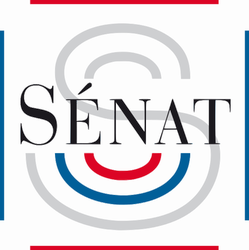
🌐suivre Marie-Anne Frison-Roche sur LinkedIn
🌐s'abonner à la Newsletter MAFR Regulation, Compliance, Law
____
► Référence complète : M.-A. Frison-Roche, audition par la Commission des Lois du Sénat sur la Proposition de Loi constitutionnelle relative à l'interruption volontaire de grossesse et à la contraception, 27 septembre 2022.
____
► Lire le dossier législatif, notamment l'exposé des motifs de la proposition de loi.
____
►Résumé de la présentation avant la discussion : ma contribution à la discussion nourrie et très large établie entre les représentants du Sénat et les administratrices et mes collègues, Elisabeth Zoller, Stéphane Mouton et Sophie Paricard, a plutôt consisté à développer la dimension concrète et pratique du sujet et la considération que celle-ci a sur la rédaction d'un texte, s'il venait à l'idée du Législateur de s'en saisir.
En effet, il s'agit non pas tant d'établir un droit subjectif, dont la dimension constitutionnelle en tant que telle peut poser techniquement problème, mais d'assurer son effectivité. Ce terme-même d'effectivité est utilisé par la proposition de loi. Or, la notion d'effectivité est utilisée dans le Droit économique, qui vise les buts, le Droit de la Régulation et de la Compliance visant à obtenir dans une sorte de réussite croissante l'effectivité, l'efficacité et l'efficience des mécanismes juridiques. Mais ce souci de politique publique est difficile à intégrer dans le système juridique, et ce que fait le Droit de la Régulation et de la Compliance est difficile à concevoir au niveau constitutionnel, la notion d' "accès à un droit" étant sans doute un pléonasme par rapport à la notion de "droit à l'effectivité", lequel vise sans doute les différents sujets de droit qui, dans la chaîne concrète qui jalonne la façon dont une femme dispose de son corps, deviendrait débiteurs d'un tel "droit d'accès à un droit".
Une telle notion peut engendrer de nombreux contentieux car les potentiels débiteurs d'un tel droit subjectif, qui aurait valeur constitutionnelle, ont aussi des droits subjectifs à opposer, et c'est une grande agressivité juridictionnelle des uns et des autres, des uns contre les autres, qui peut être ainsi engendrée.
D'ailleurs, placer dans la Constitution un tel droit subjectif sous "De l'autorité judiciaire" est inapproprié car le droit à l'avortement est protégé également par le juge administratif, non seulement à travers le contrôle objectif des textes mais encore à travers le contentieux subjectif, les établissements publics étant fortement impliqués dans sa mise en oeuvre.
En outre, de la même façon que l'arrêt Dobbs v. Jackson est un arrêt systémique, visant le fédéralisme, qui en application de la conception par la Cour de celui-ci peut et va priver d'autres droits subjectifs de leur protection constitutionnelle fédérale, le premier à tomber étant sans doute le droit des personnes de même sexe à se marier, mais d'autres peuvent venir, le Constituant français devrait d'ores et déjà (puisqu'il vise l'avenir) soit :
- viser une catégorie plus abstraite de droits subjectifs que le droit à l'avortement, en visant une catégorie . Mais comment délimiter cette catégorie ? comment le dire ?
- soit partir dans le système de liste (ce qui explique l'insertion dans l'article 16, qui met ce droit spécifique à l'avortement parmi une liste d'autres droits, et suppose donc qu'à chaque fois l'on prenne une autre loi pour mettre les autres ...
Cela suppose alors que le Législateur intervenir par à-coup, dans une liste que le juge aura bien du mal à interpréter, sans doute une "liste fermée"..., mais surtout intervienne en Ex-Post, à chaque fois qu'il pense qu'une agression est davantage probable sur un droit que sur un autre (car c'est le raisonnement ici suivi, l'arrêt Dobbs, qui ne concerne pas l'Europe, étant considéré par le Législateur français comme un "signal" de danger sur ce droit-là...) : mais le Législateur d'une part doit intervenir sur l'avenir et non pas sur le passé (les lois "en réaction" ne sont pas de bonne méthode) et doit être abstraites car c'est au juge de décliner sur des situations et droits particuliers (cf. Carbonnier et "l'effet macédonier"). Or, le Conseil constitutionnel n'est pas placé pour faire cela. Quel juge en France pourrait le faire ?
Malgré la bonne intention du Législateur, et en retournant les techniques juridiques dans tous les sens, l'on ne voit pas "quoi faire"...
Mais, puisque l'enjeu n'est pas tant l'existence d'un droit, mais l'effectivité de celui-ci, et l'efficacité d'un système médical et social à le servir dans la "réalité" des choses, pourquoi ne pas se tourner vers le Droit économique, Droit concret et téléologique par excellence ?
Dès lors, si le Législateur devait intervenir pour protéger davantage à l'avenir l'effectivité du droit des femmes à disposer de leur corps, c'est peut-être sous une forme plus incitative, en s'appuyant sur les entreprises qui, comme l'ont fait les entreprises américaines en aidant les femmes à voyager jusqu'aux Etats protecteurs, en ne communiquant pas des informations aux autorités publiques des Etats non-protecteurs, aident concrètement à l'effectivité des droits subjectifs qui sont concrètement menacés, maintenant aux Etats-Unis, éventuellement demain en Europe et en France.
Cela s'appuie sur le Droit de la Compliance.
____
Voir aussi
💬Frison-Roche, M.-A, "La Cour suprême a déclenché la bombe de la sécession. Que faire ?", 5 juillet 2022
💬Frison-Roche, M.-A, Droit à l’avortement : « Le processus de sécession est dans la décision », 27 juin 2022
📧M.-A. Frison-Roche, Seuls les droits subjectifs techniques ne sont pas touchés par l'arrêt Dobbs: c'est sur eux qu'il faut construire une nouvelle théorie de l'entreprise, 29 juin 2022
Sept. 1, 2022
Thesaurus : Doctrine

► Full Reference: J.-Ch. Roda, "Compliance, enquêtes internes et compétitivité internationale : quels risques pour les entreprises françaises (à la lumière du droit antitrust) ?" ("Compliance, internal investigations and international competitiveness: what are risks for the French companies (in the light of Antitrust Law)?"), in M.-A. Frison-Roche (ed.), Les Buts Monumentaux de la Compliance, coll. "Régulations & Compliance", Journal of Regulation & Compliance (JoRC) and Dalloz, 2022, p. 367-380.
____
📕read a general presentation of the book, Les Buts Monumentaux de la Compliance, in which this article is published
____
► Summary of the article (done by the Journal of Regulation & Compliance): The author draws on American and European Competition Law to measure whether internal investigations, as far as they provide factual elements, can provide foreign authorities and competitors, here American, with "sensitive information" (notably via leniency programs), and as such constitute a competitive handicap. But this turns out to be quite difficult, whereas compliance audits, for example under the legal duty of vigilance, can provide American litigants with useful information, drawn from internal documents, in particular the reports of compliance officers, which can be captured by the procedures of discovery.
French law remains weak face of these dangers, due to its refusal to recognize the legal privilege mechanism concerning these internal documents, contrary to the American Law and the consequent effectiveness of discovery in international procedures, concerning internal documents, in particular resulting from internal investigations. Solutions have been proposed, the activation of a new conception of blocking laws being complex, the prospect of adopting a legal privilege being more effective, but there would remain the hypothesis of an international conflict of privilege, American Law having a strict design of legal advice justifying it and judges checking that powerful companies do not use it artificially.
________
Aug. 8, 2022
Compliance: at the moment

Référence complète : Frison-Roche, M.-A., "Rendre plus coûteux l'accès au marché de la Haine, Newsletter MAFR Law, Compliance", Regulation, 8 août 2022.
____
|
July 7, 2022
Adventures of the Ogre Compliance

June 19, 2022
Law by Illustrations

► Référence complète : Frison-Roche, M.-A., Phil Spector : Avant tout une fiction ..., qui raconte par les noms et dates précises la préparation du procès de Phil Spector, 2022
____
Qui connait l'histoire et l'industrie de la musique connait Phil Spector, celui qui dans les années 60 fut le plus grand producteur de disques, innova, lança et gagna des fortunes. Puis, il disparut parce que dans un système qui se nourrit de modes l'on disparait aussi ; il resta avec ses souvenirs et son argent. C'est plutôt sous l'angle d'un procès retentissant que les médias lui redonnèrent la couverture, puisqu'il fut poursuivi pour le meurtre d'une actrice. Proclamant d'une façon spectaculaire son innocence, il fût reconnu coupable par le jury et finit sa vie en prison. Lorsqu'il mourut en 2021 en prison à plus de 80 ans, ruiné et seul, la presse titra ainsi : "savez-vous que Phil Spector a été interprété au cinéma par Al Pacino ?".
Car dans l'autre monde qu'est non plus le monde des amateurs de musique mais le monde des amateurs de cinéma, de Phil Spector, l'on n'avait pas entendu parler. Ainsi du film qui sortit en 2013, qui retrace semble-t-il pas à pas les quelques jours précédant sa comparution devant le tribunal, ceux qui admirent celui qui est qualifié de "légende" n'ont pas entendu parlé. Et sans doute les cinéphiles ne connaissent pas cette personne.
Il faut dire que le film débute par cet avertissement : "ce film est une pure fiction qui n'a aucun rapport avec des faits qui se seraient déroulés". Et pourtant le titre même du film est : Phil Spector , c'est-à-dire un titre réduit à l'identification de la personne, pour que nul ne s'y trompe. Les noms sont exacts, les dates aussi, les faits allégués sont reproduits, les lieux également. Les perruques qu'il portait, notamment celle qu'il choisit, ainsi que l'habit, au bouton près, de mettre pour le jour où le procès s'ouvrit.


Pourquoi avoir fait cela ?
Sans doute pour ne pas avoir d'ennui, dans une affaire où la personne concernée fut condamnée pour un meurtre alors qu'il affirmait avoir été témoin d'un suicide. En effet, des personnes avaient par exemple menacé Helen Mirren de s'opposer à l'attribution de toute récompense pour jouer dans un film pour présenter d'une "façon sympathique" un personnage diabolique... L'avantage d'une fiction est qu'on rend moins de compte des personnages qui ne vivraient que sur l'écran....
Pour pouvoir aussi ajouter autant de scènes que l'on veut où le personnage, désormais "de fiction" que serait ce Phil Spector qui n'aurait donc aucun compte à rendre à Phil Spector, peut apparaître dans toute sa démesure et sa rage, notamment contre la justice et la société.
Cela permet au spectateur de voir tout le travail de l'avocate, Linda Kenney Baden, interprétée par Helen Mirren :


L'on peut par exemple y voir les cross-examinations simulés par lesquelles l'avocat prépare le client ou bien, à l'intérieur même du cabinet, la façon dont à tour de rôle les avocats endossent la thèse de l'adversaire.
Dans toutes ces scènes qui furent, dans la "réalité", si théâtrales dans ce procès hors-normes autour d'une personnalité hors-norme, prévenir dans ce film présenté par tous comme une biographie que tout cela ne serait que "fiction" nous montre en tant cas les effets de miroir qu'il existe toujours entre les procès et les films autour de la réalité et le récit qui en est fait.
____
June 16, 2022
Law by Illustrations
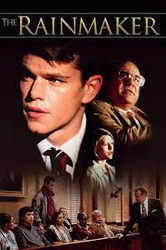
► Référence complète : M.-A. Frison-Roche., "Archétypes de l'avocat dessinés par Coppola dans𝑻𝒉𝒆 𝒓𝒂𝒊𝒏𝒎𝒂𝒌𝒆𝒓", 2022.
___
Les films peuvent décrire la réalité à travers des archétypes. C'est ce cas dans The rainmaker (L'idéaliste dans sa version française), film de Francis Ford Coppola, sorti en 1997.
Dans ce film relatant un procès entre une assurée contre sa compagnie d'assurance ayant refusé en premier lieu de prendre en charge une opération coûteuse qui aurait pu, selon elle, sauvé la vie de son fils, puis ayant refusé en second lieu de reconnaître qu'il y avait lieu à réparation pour cela, deux avocats s'affrontent dans le procès en responsabilité civile qui s'en suit, le fils étant décédé et 10 millions de dommages et intérêts ayant été demandés : l'avocat de l'assurée (joué par Matt Damon) est pauvre, seul, inexpérimenté, assez peu savant en droit et imprégné du seul de la justice ; l'avocat de la compagnie d'assurances (joué pa Jon Voight) est riche, au cœur d'une équipe, expérimenté, très savant en droit et avant tout maître des règles de droit.
Comme on s'en doute, beaucoup de films américains étaient construits sur cette trame, le jury donnera satisfaction à la demanderesse, les dommages et intérêts punitifs montant à 50 millions, tandis qu'une série de class action s'annoncent et que l'entreprise se met sous le bénéfice du Chapter 11.
Dans la réalité, les avocats ne correspondent sans doute ni à l'un ni l'autre. D'ailleurs à la fin du film le héros parfait se demande si, ou quand, il deviendra le méchant... En effet, Coppola a adressé plutôt deux archétypes : car l'avocat doit certes avoir le sens de la justice mais c'est avec des règles juridiques techniques qu'il le fait. Il doit défendre selon qui a raison, mais il doit aussi défendre celui qui a tort. Il doit défendre pour rien celui qui n'a pas d'argent, mais il doit bâtir une entreprise.
D'ailleurs à la fin du film le jeune homme se demande si, ou quand, il deviendra l'autre. En effet, Coppola ne décrit jamais qu'un seul personnage, en grossissant et en séparant ses traits et ses tensions : l'avocat.
________
April 15, 2022
Conferences
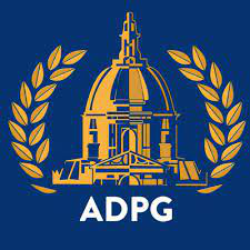
 ► Référence complète : Frison-Roche, M.A., La fonction sociale du Droit de la Compliance, Table-ronde "Les nouvelles formes d'un Droit embrassant son rôle de régulation", in📅Association du Master de Droit privé de Paris I (ADPG), Le rôle de régulateur social du Droit privé, Paris, 15 avril 2022.
► Référence complète : Frison-Roche, M.A., La fonction sociale du Droit de la Compliance, Table-ronde "Les nouvelles formes d'un Droit embrassant son rôle de régulation", in📅Association du Master de Droit privé de Paris I (ADPG), Le rôle de régulateur social du Droit privé, Paris, 15 avril 2022.
____
📅Lire le programme général du colloque
____
► Présentation générale de la conférence : En raison de la conception générale de la journée, ancrée dans le "Droit privé", mais qui oscillait en permanence sur la définition générale de ce qu'est la "régulation sociale" et qui est constitué depuis plus de vingt ans dans une branche du Droit spécifique, le Droit de la Régulation, parce qu'on m'avait demandé de présenter La fonction sociale du Droit de la Compliance, à un public sans doute peu averti du Droit économique, j'ai procédé de la façon suivante :
Je suis partie du souci actuel accru de savoir si le Droit peut avoir une part pour contenir les forces qui régissent le monde et s'y affrontent. Je suis partie de deux cas pratiques. Le premier irait plutôt vers une réponse positive, est celui de l'adoption en cours du Digital Services Act, législation européenne de Compliance qui utilise la puissance des opérateurs numériques cruciaux qui prévenir et lutte contre la haine et la désinformation dans l'espace numérique. Le second cas pratique qui débute est la possible prise de contrôle de Twitter par Elon Musk, opérée par celui-ci au nom de la "Démocratie" et pour l'instant le peu de contrôle que le Droit en cas.
A partir de de ces deux exemples, j'ai repris la définition du Droit de la Compliance, qui n'est pas la procédure par laquelle certains opérateurs devraient montrer qu'ils respectent la totalité des règles qui leurs sont applicables mais qui est substantiellement défini par des buts monumentaux substantiellement voulus posés par le Politique qui trouvent des alliés, volontaires ou contraints, en position de le faire. Ce Droit Ex Ante porte sur le futur, est de nature systémique et utilise des moyens qui traversent toutes les branches du Droit, notamment le contrat et la responsabilité.
Le Droit de la Compliance est le prolongement du Droit de la Régulation. Il opère une régulation sociale et présente trois caractéristiques. Il est forcément mondial. Il est forcément politique. Il est forcément humain.
____
Pour aller plus loin⤵️
📝Le droit de la Régulation, 2001
📝Le Droit de la Compliance, 2016
Jan. 18, 2022
Thesaurus : Doctrine
► Référence complète : A. Mbengue, "L’amicus curiae devant la Cour suprême des États-Unis", La Revue des Droits de l'Homme, in dossier "Les interprétations concurrentes de la Constitution, III- Interprétations concurrentes et observateurs, janvier 2022, n°21, pp. 1-14
____
► Résumé de l'article (fait par l'auteure) : "L’amicus curiae permet l’intervention des entités défendant des intérêts privés dans le contrôle de constitutionnalité opéré par la Cour suprême des États-Unis. La figure moderne de l’amicus curiae a créé une concurrence entre un intérêt public tel qu’il est conçu par les entités privées avec l’intérêt public tel qu’il est défendu par les organes gouvernementaux. Cela a conduit le juge constitutionnel américain à objectiver les données comprises dans les mémoires des personnes privées dans son interprétation de la Constitution par des méthodes d’appropriation des interprétations concurrentes. Cette appropriation met donc fin à la conception monopolistique de défense de l’intérêt public par les organes gouvernementaux et érige les entités privées comme des experts factuels des questions constitutionnelles. Ainsi, davantage qu’il est un élément procédural, l’amicus curiae est porteur d’une logique politique éminente dans le contrôle de constitutionnalité aux États-Unis.".
____
🦉Cet article est accessible en texte intégral pour les personnes inscrites aux enseignements de la Professeure Marie-Anne Frison-Roche
________
Oct. 14, 2021
Thesaurus : Doctrine
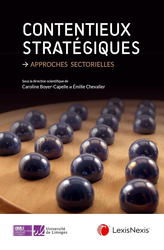
► Référence complète : C. Boyer-Capelle & E. Chevalier (dir.), Contentieux stratégiques. Approches sectorielles, LexisNexis, 2021, 220 p.
____
____
📗lire le sommaire de l'ouvrage
____
📗lire la table des matières de l'ouvrage
____
► Résumé de l'ouvrage (fait par l'éditeur) : "Née aux États-Unis, l'expression contentieux stratégique, ou strategie litigation, est employée dans la littérature juridique anglo-saxonne afin de désigner les hypothèses dans lesquelles la saisine du juge sur un cas particulier est en réalité le moyen d'attirer l'attention sur des questions sociales d'importance, en vue de provoquer une évolution des politiques ou législations existantes ou de permettre la bonne application de ces dernières. Cette utilisation stratégique des cours ou tribunaux cherche ainsi à transformer l'arène judiciaire en tribune au service d'une cause, le juge étant invité à acter les carences contestées ou à encourager les évolutions attendues dans le cadre d'un procès dont les tenants dépassent la dimension singulière du litige.Adapté au système juridique des pays de common law, le contentieux stratégique semble cependant progressivement s'acclimater dans des pays de tradition civiliste comme la France. Un nombre croissant de contentieux portent ainsi la marque de cette mobilisation d'un nouveau genre, développée au service de causes variées (environnement, protection des libertés individuelles, lutte contre la pauvreté, etc.) devant diverses juridictions.Les analyses sectorielles rassemblées dans cet ouvrage entendent proposer, à travers un cadre de réflexion commun, un état des lieux de cette évolution, permettant ainsi de donner corps à une notion aux contours encore souvent imprécis, d'éprouver le degré de maturation de cette nouvelle voie d'action et de s'interroger sur son impact réel et ses développements potentiels".
________
June 17, 2021
Thesaurus
Référence complète : Valluis, B., Etats-Unis : les lois d'un empire sans frontières, in Abis, S., Le Déméter 2021, 2021, p.265-280.
____
Valluis, Bernard. « États-Unis : les lois d’un empire sans frontières », Sébastien Abis éd., Le Déméter 2021. IRIS éditions, 2021, pp. 265-280.
March 29, 2021
Compliance: at the moment
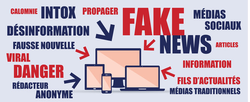
March 17, 2021
Conferences

 Full reference : Frison-Roche, M.-A., The Potential of Compliance Law (Les potentialités du Droit de la Compliance), conference given to Muriel Fabre-Magnan's students, Paris I, 17th of March 2021.
Full reference : Frison-Roche, M.-A., The Potential of Compliance Law (Les potentialités du Droit de la Compliance), conference given to Muriel Fabre-Magnan's students, Paris I, 17th of March 2021.
_____
This conference has been designed for Paris I's students following a Law cursus, specialized in Law of obligations and especially in Tort Law.
It therefore aims to show the technical content of Compliance Law and what it can become.
It has been followed by a debate with students.
Summary: Compliance Law is a branch of Law in the process of being born. We can be sure of its existence in the French positive Law, through the technical examination of laws called "Sapin 2" (2016) and "Vigilance" (2017). It appears at radically new. It is the reason why it is perceived as an attack, especially from United-States and we rather use legal knowledge to counter it. But if we study the historical reasons of its adoption in the United-States and the "monumental goals", whether they are negative (what should not appear in the future) or positive (what should appear in the future), we can measure that this Law, which is essentially Ex Ante could be the means through which scattered but legitimate public authorities and powerful but illegitimate big firms could ally. Therefore potentially Compliance Law could be the worst, simple tool of obedience (mechanical "conformité") or the best: what through which we could do something face to global problems, like global warming, or what we would accept to look in the face: the care for others.
Read the slides on which this conference was based (in French)
Oct. 22, 2020
Interviews

Full reference: Frison-Roche, M.-A., "Health Data Hub est un coup de maître du Conseil d'Etat", interview realized by Olivia Dufour for Actu-juridiques, Lextenso, 22nd of October 2020
Read the news of 19th of October 2020 of the Newsletter MAFR - Law, Compliance, Regulation on which relies this interview: Conditions for the legality of a platform managed by an American company hosting European health data: French Conseil d'Etat decision
To go further, on the question of Compliance Law concerning Health Data Protection, read the news of 25th of August 2020: The always in expansion "Right to be Forgotten": a legitimate Oxymore in Compliance Law built on Information. Example of Cancer Survivors Protection
Oct. 19, 2020
Newsletter MAFR - Law, Compliance, Regulation

Full reference: Frison-Roche, M.-A., Conditions for the legality of a platform managed by an American company hosting European health data: French Conseil d'Etat decision, Newsletter MAFR - Law, Compliance, Regulation, 19th of October 2020
Read by freely subscribing the other news of the Newsletter MAFR - Law, Compliance, Regulation
___
News Summary: In its ordinance of 13th of October 2020, Conseil national du logiciel libre (called Health Data Hub), the Conseil d'Etat (French Administrative Supreme Court) has determined the legal rules governing the possibility to give the management of sensitive data on a platform to a non-europeans firm, through the specific case of the decree and of the contract by which the management of the platform centralizing health data to fight against Covid-19 has been given to the Irish subsidiary of an American firm, Microsoft.
The Conseil d'Etat used firstly CJEU case law, especially the decision of 16th of July 2020, called Schrems 2, in the light of which it was interpreted and French Law and the contract linking GIP and
The Conseil d'Etat concluded that it was not possible to transfer this data to United-Sates, that the contract could be only interpreted like this and that decree and contract's modifications secured this. But it observed that the risk of obtention by American public authorities was remaining.
Because public order requires the maintenance of this platform and that it does not exist for the moment other technical solution, the Conseil d'Etat maintained the principle of its management by Microsoft, until a European operator is found. During this, the control by the CNIL (French Data Regulator), whose the observations has been taken into consideration, will be operated.
We can retain three lessons from this great decision:
- There is a perfect continuum between Ex Ante and Ex Post, because by a referred, the Conseil d'Etat succeed in obtaining an update of the decree, a modification of the contractual clauses by Microsoft and of the words of the Minister in order to, as soon as possible, the platform is managed by an European operator. Thus, because it is Compliance Law, the relevant time of the judge is the future.
- The Conseil d'Etat put the protection of people at the heart of its reasoning, what is compliant to the definition of Compliance Law. It succeeded to solve the dilemma: either protecting people thanks to the person to fight against the virus, or protecting people by preventing the centralization of data and their captation by American public authorities. Through a "political" decision, that is an action for the future, the Conseil found a provisional solution to protect people against the disease and against the dispossession of their data, requiring that an European solution is found.
- The Conseil d'Etat emphasized the Court of Justice of The European Union as the alpha and omega of Compliance Law. By interpreting the contract between a GIP (Public interest Group) and an Irish subsidy of an American group only with regards to the case law of the Court of Justice of European Union, the Conseil d'Etat shows that sovereign Europe of Data can be built. And that courts are at the heart of this.
___________
Read the interview given on this Ordinance Health Data Hub
To go further about the question of Compliance Law concerning health data protection, read the news of 25th of August 2020: The always in expansion "Right to be Forgotten": a legitimate Oxymore in Compliance Law built on Information. Example of Cancer Survivors Protection
Oct. 14, 2020
Teachings : Compliance Law

Résumé de la leçon.
Le Droit de la Compliance semble être synonyme d"extraterritorialité, en ce qu'il se fit connaître d'une façon spectaculaire en 2014 par la décision américaine sanctionnant la banque française BNPP. L'on a dès lors souvent assimilé "Compliance" et extraterritorialité du Droit américain, englobant les deux dans la même opprobre.Celle-ci est par exemple d'une grande violence dans le rapport dit "Gauvain" de 2019. Mais sauf à croire que le Droit n'est que l'instrument pur du Politique, en raison des "buts monumentaux" poursuivis par le Droit de la Compliance, celui-ci ne peut avoir en tant qu'instrument qu'une portée extraterritoriale, sauf à être utilisé par une Autorité locale pour ne servir qu'un but local. Dans cette hypothèse, précise et restreinte, l'extraterritorialité du Droit de la Compliance doit être combattue, ce qui est fait par la Cour de la Haye dans sa jurisprudence de 2018. Mais pour résoudre cette question particulière, l'on risque de détruire l'idée même de Droit de la Compliance, lequel suppose l'extraterritorialité. Et au moment même où le continent asiatique est en train d'utiliser le Droit de la Compliance dans une définition mécanique pour mieux s'isoler.
Si l'on prend les autres sujets sur lesquels porte le Droit de la Compliance, lequel excède la question des embargos, l'on peut même soutenir qu'il a été fait pour ne pas être brider par les territoires, lesquels sont à la fois l'ancrage des Etats et leur intrinsèque faiblesse. L'internalisation dans les entreprises permet cela. Elle le permet tout d'abord par le mécanisme de "l'autorégulation". En effet, si l'on fait un lien, voire une identification entre la Compliance, l'éthique et l'autorégulation, alors la question des frontières ne se pose plus. Ainsi, l'entreprise s'auto-instituant non seulement comme un "néo-constituant" mais comme un ordre juridique complet, y compris dans le règlement des différents et dans les voies d'exécution (enforcement par le bannissement). La question de l'efficacité est donc réglée mais ouvre alors celle de la légitimité. C'est pourquoi l'Europe a vocation à porter une conception extraterritoriale d'une définition pourtant européenne de ce qu'est le Droit de la Compliance. C'est ce à quoi les arrêts de la Cour de justice de l'Union européenne du 24 septembre 2019 viennent de mettre un coup d'arrêt.
Se reporter à la Présentation générale du Cours de Droit de la Compliance.
Consulter le Dictionnaire bilingue du Droit de la Régulation et de la Compliance et la Newsletter MAFR - Law, Compliance, Regulation.
Consulter la Bibliographie générale du Cours de Droit de la Compliance
Consulter la bibliographie ci-dessous, spécifique à cette Leçon relative aux enjeux pratiques du Droit de la Compliance
Oct. 1, 2020
Thesaurus : Soft Law
Full reference: Baer, B., Proposals to Strengthen the Antitrust Laws and Restore Competition Online, Testimony before the United-States House of Representatives, Committee on Judiciary, Subcommittee on Antitrust, Commercial and Administrative Law, 1st of October 2020
Read Bill Baer's presentation by Brookings Institution of which he is a member
Aug. 20, 2020
Thesaurus : Doctrine
► Référence complète : Dreyfuss, S., Remplacer la culture de la corruption par une culture de la compliance : l’Europe prend ses responsabilités pour son propre avenir, Le Grand Continent, août 2020.
____
July 25, 2020
Thesaurus : Doctrine
Full reference: Thouret, T., Le pharmacien, un "opérateur crucial" pour prévenir une crise des opiacés en France, Actu-juridiques, Lextenso, 2020
Lire l'article (in French)
June 25, 2020
Thesaurus : Soft Law
Référence complète : Department of Justice & Securities & Exchanges Commission, FCPA Ressource Guide, June 2020, 132 pages.
May 28, 2020
Publications
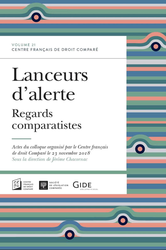
Full reference: Frison-Roche, M.-A., L'impossible unicité juridique de la catégorie des "lanceurs d'alertes" ("The impossible legal unicity of the category of "whistleblowers""), in Chacornac, J. (dir.), Lanceurs d'alertes, regards comparatistes, ("Whistleblowers, comparative perspectives"), Publications of the Centre français de droit comparé ("French Comparative Law Center"), May 2020, Volume 21, p.13-31.
Read the article (in French).
Read the general presentation of the collective book in which this article is published
Read the bilingual working paper which had served of basis for this article.
Read the presentation of the conference "Les lanceurs d'alertes: glose" (Whistleblowers: glose") and especially the slides elabored for the colloquium organized by the Centre français de droit comparé ("French Comparative Law Center") on 23th of November 2018 under the direction of Jérôme Chacornac
____
Introduction of the article
"Whistleblowers". This is a new expression. Which is a great success. Barely heard once, we hear it everywhere ...
A topic not of course or knowledge test, but rather a topic of daily conversation. Because it is spoken to us every day, in more or less gracious terms. For example President Donald Trump on October 1, 2019 declared to the press "want to question" the whistleblower who would have illegally denounced him and would not, according to him, have the right to conceal his identity, proof in this according to him of the lying character of his assertions against him, while his lawyer indicates on October 6, 2019 that he is not speaking on behalf of a single whistleblower thus taken to task but of a plurality of people who gave information against the President of the United States. Even the most imaginative screenwriters would not have written such brutal and rapid twists and turns. Spectators, we are waiting for the next episode, secretly hoping for the escalation.
And precisely if we go to the cinema, it is still a whistleblower whose dedication and success, we are told about, even the drama, for the benefit of global society, and in particular democracy, since the secrets are fought for the benefit of the truth. The Secret Man designates Mark Felt as the first whistleblower. Returning to what we often present as being a more "serious" media!footnote-1391, we listen to France-Culture and here is another story told by a historian who worked as an archivist on events that political power would have liked to keep hidden by possibly destroying their traces but which its trade led to preserve: here it is expressly presented to the studious listeners like a "whistleblower" .... While the same radio tries to find the one who could well be, as in a kind of contest the "first whistleblower"!footnote-1727? .... This rewriting of History can be defended because ultimately what did other Voltaire do for Calas, or Zola for Dreyfus?
It is also a subject of legislative discussion since in the United States the Dodd-Frank law of 2010 inserted in the law of 1934 which established the Securities & Exchanges Commission a complete device of remuneration and remuneration of the whistleblowers, whereas after having developed flexible but guiding lines in this regard in 2012!footnote-1698, the European Commission published on November 20, 2018 the text of what will become a Directive intended to give a unified European status to the character, in the system gradually developed to protect the one who was presented in 2018 as that "cannot be punished for having done what is right".
In Europe, the Directive first approved by a Resolution of the European Parliament on April 16, 2019 on the protection of persons denouncing breaches of Union Law and then adopted on October 7, 2019 (Directive of the European Parliament and of the Council of European Union on the Protection of Persons who Report Violations of European Union Law, different title, it should be noted, will have to be transposed into the laws of the Member States within the next two years. , since only "violations of Union Law" are targeted, but the character of the "whistleblower" is more generally targeted: he is "whole"!footnote-1699.
In short, the whistleblower is a star!footnote-1390. A sort of historical figure, covered in blows and glory, going from Voltaire to Snowden, both of whom find themselves embodied on the screens!footnote-1681 ....,
Consecrated by law, which associates with it a legal regime of protection to such an extent that, like a Nessus tunic, it is this legal regime which will define the character and not the reverse. When we read the law of December 9, 2016 relating to transparency in the fight against corruption and the modernization of economic life, known as "Sapin 2", we notice that the Legislator makes much of this character, since 'he dedicates its chapter II to him!footnote-1682: "From the protection of whistleblowers", and that it is by his very protection that he formally opens the door of Right to him.
But why a plural? Admittedly when we read the recitals of the Community Directive of October 7, 2019 on the protection of whistleblowers!footnote-1702, it is only a list of all the subjects on which it is a good idea to protect them, which therefore prompts us to see in this plural only the index of this non-exhaustive list of subjects which it is good to tell us, a sign of the lack of definition of who should alert us. Reading the French law known as "Sapin 2" makes it less severe but more perplexing. Indeed, this plurality referred to by the title of the chapter devoted to "whistleblowers", there is no longer any question in the rest of the law, in the very definition which follows, article 6 which opens this chapter devoted to "whistleblowers" offering the reader immediately a singular since it begins as follows: "A!footnote-1684 whistleblower is a person ...". No mention of diversity. The art of legislative writing would however have required that the qualifying article not only be singular but that it should not yet be undefined. Stendhal if he had still deigned to have the law for bedside book would have wanted to find at the beginning of chapter a sentence like: "The!footnote-1683 whistleblower is a person ...".
Thus seem to contradict themselves within the law "Sapin 2 the very title which presents the character, in that it uses a defined plural (the) while the defining article which presents it is in the undefined singular (one). ...
Here is a first reason not to advance any more but in a very careful way, in this "step by step" that constitutes a reading word for word: a gloss. This consists of taking the expression itself literally. The second reason for this technical choice is that the gloss is well suited to the introduction of a collective work, thus allowing more targeted developments to take place in other contributions, on the techniques, the difficulties and the limits of this protection, or on its history, or the reasons for the arrival in French law of these whistleblowers and the way they develop, or not, elsewhere.
I am therefore going to content myself with taking this already legal expression to the letter: The (I) whistle (III). blowers (II).
April 15, 2020
Thesaurus : Doctrine
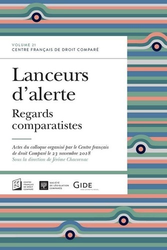
Full reference: Chacornac, J. (ed.), Lanceurs d'alerte: regards comparatistes (written in French), Editions de la Société de Législation Comparée, Vol. 21, avril 2020, 192 p.
This book follows the conference organized by the Centre français de droit Comparé on 23rd of November 2018
Read the fourth of cover (in French)
Read the table of contents (in French)
Read the presentation of Marie-Anne Frison-Roche's article: L'impossible unicité de la catégorie des lanceurs d'alerte, which is the introduction of the book
_____
Dec. 12, 2019
Conferences
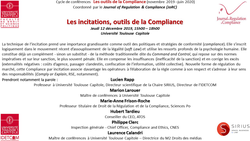
Référence : Frison-Roche, M.-A., La sanction comme incitation dans les techniques de compliance, in Faculté de droit de l'Université Toulouse-Capitole, Journal of Regulation & Compliance (JoRc),Les incitations, outils de la Compliance, 12 décembre 2019.
- Lire la présentation générale du cycle de conférences, consacré au thème Les outils de la Compliance
- Lire la présentation de l'ouvrage qui sera publié ultérieurement
- Lire la présentation de la collection Régulations & Compliance dans laquelle l'ouvrage sera publié
Résumé de la conférence
La Compliance ne se réduit pas à une méthode d'efficacité du Droit. Sinon il convient de l'appliquer à toutes les branches du Droit, ce que l'on ne fait pas. Mais même substantiellement défini, en ce qu'il est un prolongement du Droit de la Régulation, internalisé dans des "opérateurs cruciaux", délié ainsi de la détermination préalable d'un secteur, il conserve la nature téléologique de celui-ci. Le Droit qui est aussi un outil ne devient plus alors que cela, puisque la norme est placée dans le but.
Le renversement du traitement juridique de la matière pénale par la théorie appliquée des incitations
On observe très souvent que le Droit de la Compliance a pour cœur des sanctions, auxquelles Droit, dans son exercice inhérent de qualifié, donne le nom qui correspond à la chose : la "matière pénale". Logiquement, comme pour le droit pénal, qui n'est que la forme juridique de la matière pénale, le régime juridique devrait être le même que le Droit pénal. Mais il n'en est rien en raison de l'application de la théorie des incitations. De cela, les juristes et les juges n'en reviennent pas et c'est pourquoi il y mettent des limites que les tenants de la théorie des incitations n'admettent pas. Cela ne tient pas de la simple technique, de tel ou tel cas, mais de l'opposition de fond. En effet, pour le Droit pénal, celui-ci a vocation à être "autonome" dans le système juridique, c'est-à-dire développe des notions et des régimes qui lui sont propres parce qu'il est une exception légitime au principe de liberté auquel il rend par essence hommage et ne saurait se définir autrement, tandis qu'insérée dans la notion "d'incitation" la technique de la sanction n'intègre en rien cela et se contente d'emprunter à l'efficacité de la dureté pénale pour rendre efficace la règle sous-jacente ainsi dotée, la sanction étant ainsi et par un semblable effet de nature dans une parfaite dépendance. Il y a donc à première vue opposition de fond entre "sanction" et "incitation" alors qu'intuitivement frapper fort est si "commode et dissuasif" lorsqu'on veut obtenir d'une entreprise tel ou tel comportement..
En effet, certes la perspective d'une sanction en Ex Post en cas de manquement est la meilleure incitation à l'obéissance en Ex Ante à la norme d'interdiction et de prescription. C'est pourquoi le droit financier le plus libéral est également le plus répressif, l'analyse économique du droit conduisant à calculer des normes qui amènent l'agent à ne pas avoir intérêt à commettre un manquement. A l'obéissance se substitue l'intérêt. Le Droit de la concurrence et le Droit des marchés financiers en sont à ce point familiers que certains ont douté de la juridicité.
Mais cela produit aussi des chocs en retour très importants, dans une méconnaissance assurée des principes, pourtant de valeur constitutionnelle, constituant la base de la matière pénale. On peut en dresser la liste :
- des sanctions qui ne sont plus l'exception mais l'ordinaire, le cœur dans les régulations des marchés et le droit des entreprises supervisées, contraire aux principes économiques libéraux
- des sanctions d'autant plus élevées qu'elles sont négociables en échange de ce que veut la puissance publique : ainsi la pénalisation n'exclut en rien la contractualisation, au contraire elle en est un sous-outil entre les mains de l'autorité administrative ou politique de poursuite
- des sanctions qui sont conçues indépendamment des principes procéduraux, le couple "droit pénal/procédure pénale" perdant son intimité
- des sanctions qui sont échangées contre des preuves (programmes de clémence, qui sont des outils de Compliance)
- des sanctions qui ne sont pas arrêtées par le temps : application immédiate et rétroactivité dans le temps
- des sanctions qui ne sont pas arrêtées par l'espace : extraterritorialité de l'application des sanctions
- des sanctions contre lesquelles, la matière pénale étant indissociable de la façon de les appliquer ("Procédure pénale") les entités aptes à en répondre devant justifier leur comportement et non être présumées conformes dans celui-ci
- des sanctions qui se cumulent pour un même fait si cela est efficace ;
- l'abandon des notions classiques d'intentionnalité et de causalité, puisque le raisonnement est fonctionnel et non causal.
Cela est-il admissible ?
Non car en premier lieu dans une conception classique du Droit pénal c'est une succession de principes constitutionnels qui sont méconnus et les juges vont bloquer un Droit de la Compliance dont le seul principe serait l'efficacité : le Droit ne peut être un seul "outil d'efficacité", sauf à n'être plus le Droit. Le Droit pénal est un outil d'inefficacité parce qu'il se définit comme une exception légitime à la liberté des êtres humains et donc le gardien de ce principe de liberté, ce qui est étranger à la théorie des incitations, mais lui est supérieur et bloque les effets déroulés par celle-ci.
Non car en second lieu dans une conception trop étendue de la Compliance, consistant à l'appliquer à toutes les règles dont on voudrait qu'elles soient effectives parce que celui-ci qui les a émises le veut, ce qui voudrait pour toutes les règles, même celles qui ne sont pas d'ordre public. Dans une telle "passion pour la Réglementation" mettant fin au libéralisme et au Droit, les sanctions permettent à une Autorité publique d'imposer en Ex Ante avec l'accord des intéressés ce qu'il veut, comme on peut le voir en Asie, la répression passant en Ex Ante se transformant en rating et obtention volontaire d’obéissance pour toute prescription.
Oui si l'on définit correctement le Droit de la Compliance dans un seul lien avec des "buts monumentaux" qui seuls peuvent justifier la violence des mécanismes de sanction, en tant qu'il est le prolongement du Droit de la Régulation. La Régulation de l'économie est plus que jamais nécessaire, alors que les Etats n'ont plus de prise. Par l'internalisation dans les entreprises, si des "buts monumentaux" sont visés et contrôlés, alors le caractère restrictif de la matière pénale passe de l'outil au but : seuls les buts monumentaux peuvent justifier tous les effets précédemment décrits, mais ils le justifient.
L'enjeu est donc de redessiner le principe restrictif des sanctions non plus en celles-ci mais dans le but de Compliance servi par celles-ci. Par ce passage de la conservation de la nature restrictive de la sanction, non plus dans l'outil-même de la sanction mais dans le but servi par celle-ci. Non pas n'importe quelle règle, comme dans certains pays, non pas toutes les règles de ce que l'on appelle d'une façon trop extensive la Compliance, qui est juste le "fait d'obéir aux normes applicables".
Ainsi et par exemple, l'application extraterritoriale de normes nationales répressives adoptées dans un seul but national (embargo) est inadmissible et doit être rejetée par les Tribunaux, alors que cette même application extraterritoriale de normes pour lutter contre le blanchiment d'argent est admissible et pratiquée par tous. Suivant la nature du risque combattu, le terrorisme par exemple, le régime de la sanction est ou n'est pas légitime.
D'une façon plus générale, les "buts monumentaux" qui donnent au Droit de la Compliance sa définition substantielle, alors que beaucoup réduisent encore la Compliance à une simple méthode d'efficacité, voire n'y voient rien de juridique, permettent de distinguer là où la sanction doit être un outil plus ou moins violent pour atteindre le but en raison de la légitimité de celui-ci, du phénomène caché qu'il s'agit de combattre (par exemple terrorisme ou blanchiment) ou du caractère global (par exemple risque environnemental).
____________

Nov. 27, 2019
Publications

This Working Paper served as the basis for an intervention in the conference organized in the conference cycle organized by the Journal of Regulation & Compliance (JoRC) on the theme: Compliance Tools, in collaboration with many university partners: this first conference is organized in collaboration with the Sciences po Economics Department and is held on November 28, 2019 at Sciences po and deals with the more specific theme of Risk mapping.
It also serves as the basis for the book edited by Marie-Anne Frison-Roche, Compliance Tools, which will be released in the Regulations & Compliance collection.
______
Is the consideration by Law of the Risk Mapping mechanism so new?
At first glance yes, and one might even be surprised at this novelty, since this rational anticipation of risks should have been recognized for a long time. But this is perhaps due to the more general fact that Risk itself has only recently become an autonomous legal object in Economic Law, in particular because Risk does not have at all the same position in Competition Law and in Regulation Law (I) .. Its position is even opposed in the both, Risk becoming central in Regulation Law. Compliance Law being the extension of Regulatory Law, it is also built on the "concern" of Risk and the internalization of this consideration in enterprises therefore takes the form of mapping.
A closer look maybe not,even before the specific French laws, called "Sapin 2" and "Vigilance" and beyond them, case law decisions giving a general scope to maps drawn up by operators, or increasing the obligation that 'they have to do it (II). In this, general and precise technical Law offers points of support for Compliance Law, strengthening it in its tools.